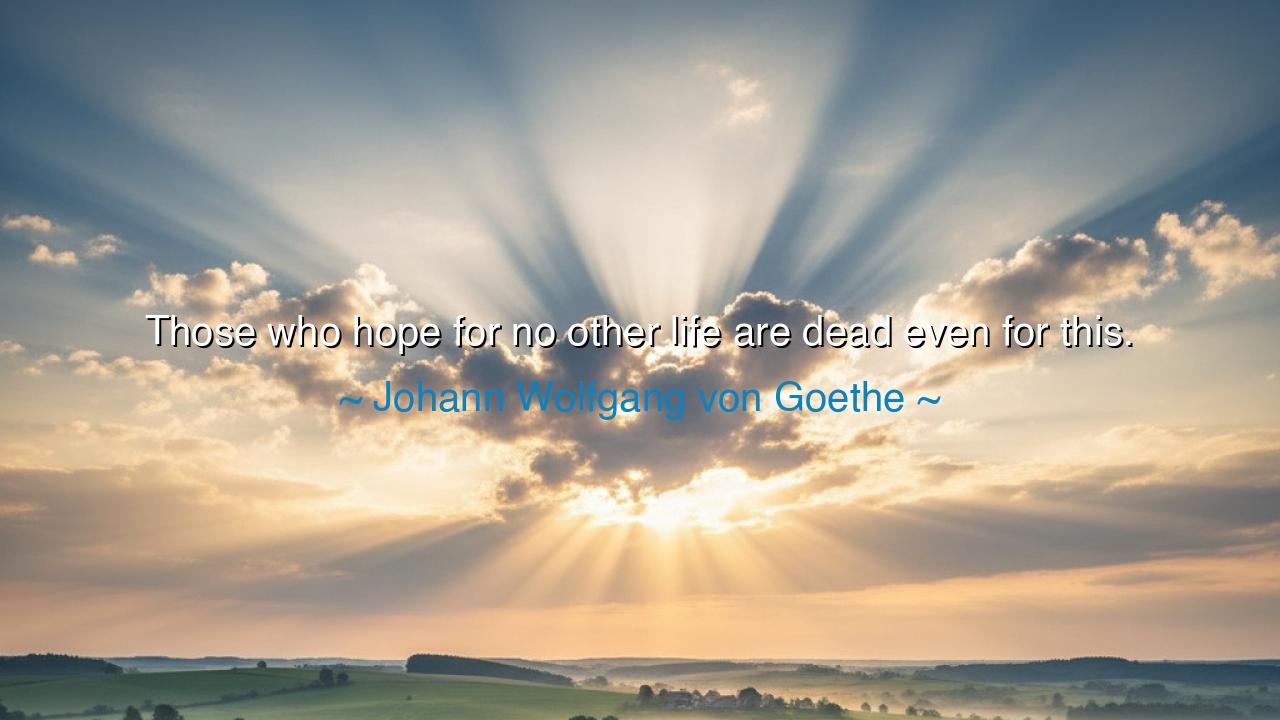
Those who hope for no other life are dead even for this.






“Those who hope for no other life are dead even for this.” Thus spoke Johann Wolfgang von Goethe, the sage of Weimar, the poet whose words cut to the very marrow of the human condition. In this short but piercing truth, he warns us of a death deeper than the grave—the death of the spirit, the decay of the soul that has ceased to hope, to dream, to believe in something beyond the veil of the visible. Goethe teaches that man’s vitality is not sustained by breath alone, but by vision—by the longing for something higher than himself. The one who has lost that longing walks the earth as a shadow, alive in body but hollow within.
The origin of this quote springs from Goethe’s lifelong meditation on the dual nature of existence—the earthly and the eternal, the seen and the unseen. He lived in an age when reason was rising and faith was waning, yet he saw that neither intellect nor pleasure could fill the human heart without hope in eternity. Whether one’s “other life” be heaven, truth, or the perfection of the soul, Goethe understood that man must believe in a greater horizon. For to hope for nothing beyond is to reduce life to the fleeting dance of dust—to strip it of meaning, to live as though one were already entombed in despair.
What Goethe calls “death” is not the end of breathing, but the end of wonder. It is the stillness of a heart that has ceased to reach beyond itself. When a man no longer dreams of anything greater than what he already possesses—no truth to seek, no love to deepen, no soul to elevate—then his days become a slow burial. He eats, he speaks, he works, but he no longer lives. For life is not measured by years, but by aspiration. It is the reaching that keeps us human. As the flame dies when it no longer draws air, so the soul perishes when it ceases to hope for eternity.
Consider, O listener, the tale of Viktor Frankl, the great psychiatrist who survived the death camps of Auschwitz. Surrounded by starvation, brutality, and death, he observed that those who survived longest were not the strongest of body, but the richest of spirit. They were the ones who hoped—who believed in something beyond the barbed wire: a reunion, a purpose, a life after suffering. But those who lost that inner vision, who said to themselves, “There is nothing more,” withered quickly, even if their bodies were still whole. In them, Goethe’s prophecy came true—they were dead even for this life, for their souls had already surrendered to the void.
To hope for another life does not necessarily mean to await paradise in the clouds. It means to live with the certainty that existence is not meaningless, that each act of goodness, each struggle for truth, each spark of love echoes beyond our mortal span. It means to look at the stars and know that the soul is made of the same fire—that something eternal calls us upward. Goethe, who saw God not only in cathedrals but in the movement of rivers and the turning of leaves, teaches that hope in eternity is the foundation of vitality. Without it, the human heart becomes barren ground where no flower can grow.
In this light, his words are both a warning and a blessing. He warns the cynic who says, “This world is all there is,” for such a one is already entombed in hopelessness. Yet he blesses the dreamer, the seeker, the humble believer who dares to trust that life has meaning beyond decay. To such a soul, every sunrise is sacred, every pain a lesson, every death a doorway. The one who hopes in eternity lives fully—not because he denies mortality, but because he transforms it into purpose.
So, O child of earth, let Goethe’s wisdom dwell within you: Do not live as though this were all there is. Lift your eyes beyond the dust and see the eternal in the present moment. Hope for another life—not to escape this one, but to give it meaning. Let your faith, whatever its form, be the root that keeps your soul alive through drought and storm. For the one who hopes only for what his hands can hold is already empty, but the one who hopes for the unseen lives with inexhaustible light.
Therefore, remember: hope is not a promise of what will be, but the breath of what already is—the divine whisper that says, “You are more than flesh, and life is more than this hour.” Those who forget this hope walk among the living as the dead. But those who cherish it carry eternity within them, and even in death, they are truly alive.






AAdministratorAdministrator
Welcome, honored guests. Please leave a comment, we will respond soon